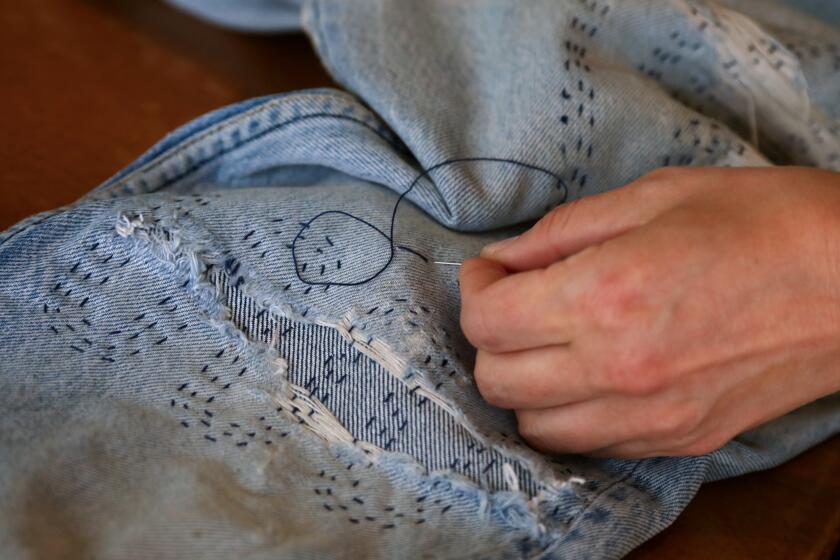A Force of Nature in Chile
Both made their fortunes in trendy West Coast-based apparel: she as a longtime chief executive with the Patagonia label, he as co-founder of the Esprit line.
And both jettisoned the boardrooms and fashion shows to devote much of their accumulated millions to a singular, and contentious, cause: preserving the wild redoubts of this continent’s southern cone, from the mist-shrouded rain forests and arid steppes of Patagonia to the wetlands and savannas of northeastern Argentina.
“I come from California, where there is still great beauty, but California has been absolutely overrun,” Kristine Tompkins said in the couple’s cozy gray-shingled home on the spectacular Renihue fiord, along the wind-whipped Pacific Coast. It is about 700 miles south of Santiago, the Chilean capital.
“Maybe I have some of my great-grandfather’s California genes. A lot of Patagonia is like California 150 years ago.”
Kris is less renowned, and more diplomatic, than her outspoken husband, Douglas, a counterculture veteran who walked away from Esprit with a reported $150 million in 1990, split with his then-wife and longtime business partner and remade himself in South America as a patron of preservation. Here, in a region with no tradition of private citizens buying land for conservation, he has been alternately reviled and acclaimed.
Not known for his modesty, Tompkins sees himself in the tradition of the Rockefellers and other “eco-philanthropists” who faced down developers and bought lands that eventually were incorporated into U.S. national parks, including Wyoming’s Grand Teton and Maine’s Arcadia.
“Parks generate tremendous local opposition at first -- it’s a given,” said Tompkins, more compact and less bombastic in person than his outsized reputation would suggest. “Then, after a while, once the thing gets established, the locals are the most fierce defenders. Sometimes it takes 20 years. But go up to Yellowstone now, for example, and ask them if they want to [disestablish] that park? There would be revolution.”
Many tycoons have been drawn to the mountains, plains and coasts of Patagonia, a region that straddles Chile and Argentina. CNN’s Ted Turner, financier George Soros and Italy’s wealthy Benetton Group have purchased expansive tracts.
But the Tompkinses live on their land, preaching ecology and serving as lightning rods for nationalistic ire and outright paranoia.
“I know in my heart that land and issues about land and land usage strike at the very depth of our hearts,” Kris, 55, says of the controversy that has shadowed their efforts.
Using several foundations and investing more than $150 million, most of it their own, the couple have methodically bought more than 2 million acres of varied terrain in South America. They have accumulated parts of volcanoes, glaciers and 1,000-year-old stands of alerce trees, a towering larch species that Chile declared a national monument in 1976.
A fleet of Cessnas ferries these eco-barons about their domain, with Doug Tompkins, a longtime pilot, often flying solo, surveying his lands with the same fervor once employed in designing Esprit emporia. He repeatedly berates the “techno-industrial society,” despite the aircraft, satellite phone, computers and other gadgets that facilitate his calling.
His Pumalin Park project here in southern Chile, Tompkins’ signature effort (named after the resident pumas), sprawls over 762,000 acres, an area as extensive as Yosemite National Park. It also in effect slices this narrow nation in two, a fact that irritates the Chileans’ sense of sovereignty.
What may be a sincere noblesse oblige comes across to many here as arrogant, even imperious. At their most extreme, Chileans have accused Tompkins of being a CIA agent, Israeli spy, cultist and clandestine gold miner. Others, however, just don’t want an American telling them what to do, even if they agree with his intent. Many see him as inflexible -- he opposes a road or power lines through Pumalin, for instance.
“Tompkins generates resistance and some support because his positions are so fundamentalist,” says conservative Chilean Sen. Antonio Horvath, who argues that the U.S. public would never accept foreign land purchases that cut an entire state in half.
“I can’t imagine a situation where people traveling from Washington or New York to Miami, for instance, would be obliged to do it only by ferry or air.”
For Tompkins, saving the land is all. He professes concern for the fate of those who work in the forests, pastures or seas, but insists that the salmoneros, gauchos, lumbermen, shepherds and others displaced by his environmentally correct scheme must find other employment, perhaps in ecotourism. That attitude has alienated many.
“I think a lot of what Senor Tompkins has done to preserve the land is admirable, but we can’t all live off the beauty,” said Yvonne Catin Romero, 25, a neighbor who ferries tourists on her boat in Renihue fiord but also raises salmon there, an industry Tompkins abhors as polluting. “Salmon is important for many people’s livelihood here.”
Though sometimes derided as an Ugly American, Tompkins, 63, is a strident critic of U.S. foreign policy, which welcomed the overthrow of Chile’s leftist government in 1973 and actively supported dictator Augusto Pinochet. But he is an unabashed enthusiast of the U.S. conservation movement.
“For all our shortcomings in America, the conservation tradition is a long one and a really beautiful story about Americans as conservation philanthropists,” said Tompkins, seated by a stone fireplace inside his fiord-side home, an organic garden and the Jurassic-like vegetation of the temperate rain forest visible through the picture windows. “That’s where Americans really shine.”
Tompkins, son of a New York antique dealer, dropped out of prep school on the East Coast to explore the West, living for a time as a ski bum in Aspen and a tree trimmer at Lake Tahoe before founding the North Face outdoor equipment label in a Bay Area storefront in 1964.
He first visited Patagonia as an aspiring Olympic ski racer in the early 1960s. He and his buddy Yvon Chouinard, who later founded the Patagonia label, drove a Ford van from California to Tierra del Fuego in 1968, surfing the Peruvian coast, skiing the Andes and blazing a new route up the massif of Patagonia’s Mt. Fitzroy, whose spires, a holy grail for rock climbers, were adopted as the Patagonia clothier’s logo.
The next year, Tompkins co-founded the company that would become Esprit with Susie Russell, then his wife. The San Francisco-based firm was a runaway hit before it ran into a wall amid changing tastes and the much-publicized discord between husband and wife.
Upon abandoning the business with fortune in hand, Tompkins became a missionary of the so-called deep ecology movement pioneered by Arne Naess of Norway, whose writings argue that only a “deep” transformation of modern society can head off ecological ruin.
The business world “had trapped my imagination and footloose spirit,” Tompkins explains on the website of the Conservation Land Trust, one of his foundations.
Tompkins first purchased land in Chile in 1990 after scouting Canada, Alaska and other locales as a potential base. He recounted a visit here via boat with one of his two daughters from his previous marriage.
“The clouds were all just hanging around,” he recalled. “That was just incredible that day. I thought, ‘This is the place.’ ”
The couple, who had known each other for more than 20 years through mutual acquaintances, wed in 1994. A fourth-generation Californian, Kris worked in Chouinard’s mountaineering shop during college and stayed on to become general manager, and later chief executive as the firm expanded into clothing. She remained on the board when she moved to Chile in 1993, but in 2000 sold her stock back to Chouinard and his wife and used the proceeds to found Conservacion Patagonica.
“I hope everybody has the experience of going to a place and somehow just instinctively you know that it’s your place, it’s where you belong,” she said. “And in my personal experience, the Patagonia region is mine.”
The Tompkinses work as a team. But their earthy creed was not an easy fit for Chile, a conservative, overwhelmingly Roman Catholic country of 16 million. Bishops worried about a hidden population-control agenda.
Perhaps the couple’s most persistent adversary has been the fast-expanding farmed-salmon industry, a $1-billion-plus concern that is a major source of wealth for southern Chile. Wastes from the salmon pens (“hog farms,” Doug calls them) along the largely pristine shoreline are generating “dead zones” on the ocean floor, he and others argue.
Chilean salmon executives, major exporters to the United States, say their procedures are in accord with international standards.
“We are not going to be intimidated by imperialist boasts or frivolities of the millionaire gringo,” Carlos Vial, president of SalmonChile, the principal trade group, told reporters last year after Tompkins proposed a moratorium. “We are not going to accept a sub-nation in our own region with rules dictated by a fanatic.”
At the moment, Tompkins is fighting a Spanish firm’s plans for a $4-billion hydroelectric plant in Patagonia to serve the needs of energy-starved Chile.
Despite his high-profile polemics, Tompkins probably has at least as many admirers on the continent as he does detractors. The Chilean government, once hostile, last year bestowed national sanctuary status on Pumalin Park, which is visited by about 10,000 tourists a year and widely considered a major success.
Besides Pumalin, which remains in a private trust, the Tompkinses have donated privately purchased lands to help create nearby Corcovado National Park and Monte Leon National Park, site of a major penguin rookery along the coast of Argentine Patagonia. In dozens of other conservation undertakings, the couple have chipped in with cash, advice or both.
These days, much of Doug’s energy is expended across the Andes, in northeastern Argentina, where he has bought about 600,000 acres of ranches, forests, farmland -- even a sawmill -- in and around the threatened wetlands known as the Esteros del Ibera, one of the continent’s most diverse wildlife habitats. His plans include the eventual reintroduction of a number of species that were wiped out, including the giant river otter, the giant anteater and the jaguar.
To the south, Kris is taking the lead in the proposed Patagonia National Park, its centerpiece a sheep ranch of 173,000 acres purchased by her foundation for $10 million after a bitter battle with rival Chilean businessmen. The 20,000 sheep and 3,000 cows are being sold off, and employees of the Patagonia clothier (which kicked in financial support) have been coming down to remove fences and eradicate nonnative species.
The couple have enough going on to keep them busy for a long time. Both vow to live past 100.
“We’re living our life here, and we like it,” Kris said. “Doing the work we believe in. Work that gets us up and out of bed every day.”
*
Andres D’Alessandro in The Times’ Buenos Aires Bureau contributed to this report.
More to Read
Start your day right
Sign up for Essential California for news, features and recommendations from the L.A. Times and beyond in your inbox six days a week.
You may occasionally receive promotional content from the Los Angeles Times.






